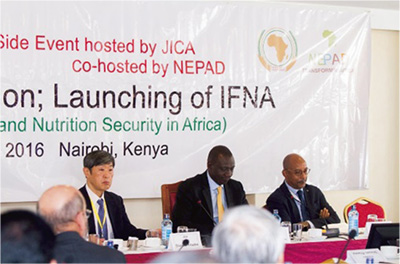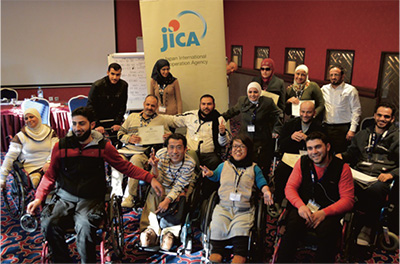Diplomatic Bluebook 2017
Chapter 3
Japan's Foreign Policy to Promote National and Worldwide Interests
Section 2 Japan's International Cooperation (Development Cooperation and Response to Global Issues)
Overview
(Development Cooperation Charter and Strategic Use of ODA)
More than sixty years have passed since Japan started its Official Development Assistance (ODA)1 in 1954. Japan's development cooperation policy including ODA has greatly contributed to securing the peace, stability, and prosperity of the international community and consequently the national interests of Japan for many years.
On the other hand, the international situation with regard to development cooperation is at a major crossroad. The world is facing more diverse and complex challenges transcending national borders as the world becomes increasingly globalized. Furthermore, considering the growing roles of recent non-ODA public/private funds and support from emerging countries, it is important to collect wisdom and actions of developing countries as well as developed countries and various resources apart from the central government (corporations, local governments, NGOs, etc.). In this new era, it is essential for ensuring Japan's national interests that Japan should consider development cooperation as a part of “Proactive Contribution to Peace” based on the principle of international cooperation, and strategically use ODA to address development and human rights issues while continuing to adhere to the course that Japan has taken to date as a peace-loving nation. Under the Development Cooperation Charter established based on this recognition (decided by the Cabinet in February 2015), there is a need to steadily implement the “2030 Agenda for Sustainable Development,” the international development goals. It is also vital to establish anew a fully adequate system in order to secure the safety of Japanese people engaged in international cooperation abroad.
For Japan, development cooperation is one of the most important diplomatic tools and is essential for its proactive contribution to peace, stability, and prosperity of the international community, from humanitarian assistance such as initiatives to resolve issues concerning refugees in the Middle East and Africa, emergency assistance in response to disasters, to economic and social development in developing countries such as infrastructure development and human resource development. At the G7 Ise-Shima Summit held in May, which Japan presided over, Japan announced that it would provide support of about 6 billion US dollars over three years for stabilizing the Middle East region, 1.1 billion US dollars to tackle global health issues, and support human resource development to promote the empowerment of women. In addition, at the TICAD VI held in August, Japan took strong initiative aimed at resolving international development issues, including announcements on its plan to invest in Africa's future through efforts such as human resource development for about 10 million people, development of quality infrastructure at a scale of 30 billion US dollars from the public and private sectors combined, the establishment of health systems, and building foundations for peace and stability.
The revitalization of Japan's economy through the growth of developing countries and its growth alongside these countries is also an important issue for Japan's national interest. As described in the “Japan Revitalization Strategy” (revised in June 2016) and “Infrastructure Systems Export Strategy” (revised in May 2016), it is necessary to utilize ODA strategically in order to further promote the overseas expansion of Japanese corporations. In May, Japan announced that it would provide financing of approximately 200 billion US dollars in the next five years to infrastructural projects across the world, as part of an all-Japan effort under the “Expanded Partnership for Quality Infrastructure.” (see Special Feature “Quality Infrastructure Investment”) Based on the “Free and Open Indo-Pacific Strategy” proposed by Prime Minister Abe in August (see Special Feature “Free and Open Indo-Pacific Strategy”), it is important to promote quality infrastructure investment to strengthen the “connectivity” between Asia and the Middle East/Africa, while proactively utilizing ODA, so as to continue contributing to the peace, stability and prosperity of the international community.
Such efforts by Japan have won both high praise and trust from the international community. Japan has to continue and strengthen the efforts in the future so that Japan can lead the international community as a major responsible country in the world and ensure the international environment and order in line with Japan's national interests.
- 1 For details on Japan's international cooperation, refer to âJapan's International Cooperationâ of White Paper on Development Cooperation.
(Response to Global Issues)
While globalization has resulted in dramatic economic and social development worldwide, it has also brought about diverse threats to human security. The threats include conflict, terrorism, disasters, global environmental issues such as climate change, global health issues including infectious diseases, human trafficking, refugee issues, labor issues, and economic crises. These global issues cannot be addressed by one country alone. The international community must work together based on the concept of human security. While the year 2015 was a “milestone year” because new frameworks for these global issues were formulated, the year 2016 was the first year for the implementation of these frameworks, and Japan exerted its leadership through TICAD IV and the G7 Ise-Shima Summit that it presided over.
With the aim of implementing the Sustainable Development Goals (SDGs) that were adopted as international development goals with the year 2030 as the target deadline, the SDGs Promotion Headquarters was established within the Cabinet in May 2016, headed by the Prime Minister and comprising all Ministers as members. Japan's guidelines toward the achievement of the SDGs (SDGs Implementation Guiding Principles) were decided upon in December. In the area of disaster risk reduction, which is essential to realize sustainable development, the “Sendai Framework for Disaster Risk Reduction 2015-2030” was adopted at the Third United Nations World Conference on Disaster Risk Reduction in Sendai in March 2015, and steady efforts are underway to bring disaster risk reduction into the mainstream. The enactment of “World Tsunami Awareness Day” (November 5), adopted at the UN General Assembly in December 2015, was followed by the implementation of related activities in 2016 including events to raise awareness about the “World Tsunami Awareness Day” in Japan and around the world, as well as tsunami disaster evacuation exercises. In the area of health, Japan contributed to the international efforts in addressing global health challenges based on the “Basic Design for Peace and Health” formulated in September 2015 as its Global Health policy under the Development Cooperation Charter. These issues were highlighted at the G7 Ise-Shima Summit in May 2016, and TICAD VI in August the same year, where Japan took the lead in discussions on health system strengthening, including strengthening response capability to public health emergencies such as infectious diseases, and promoting of Universal Health Coverage (UHC)2 that contributes to crisis response.
In the area of climate change, the Paris Agreement was adopted at the 21st Session of the Conference of the Parties to the United Nations Framework Convention on Climate Change (COP21) held in France in December 2015. This Agreement is a fair and effective framework that provides for the setting and submission of greenhouse gas emission reduction goals by each country independently, with no distinction between developing and developed countries, and for the implementation of initiatives toward the achievement of these goals. It entered into force on November 4, 2016. Japan completed its ratification procedures for the Paris Agreement on November 8 and participated actively in negotiations on the formulation of the relevant guidelines at COP22 (held in Morocco). The adopted agreement reflects Japan's assertions and established the continued negotiations on the relevant guidelines through the participation of all countries as well as the adoption of these principles by 2018.
Japan will continue to cooperate with the respective countries, international organizations, and civil society, etc., under the Global Partnership; promote human security including its areas of strength such as disaster risk reduction, health, women, and education; and work actively toward the resolution of global issues.
Arctic issues are coming up for debate in the international arena, as changes in the Arctic environment caused by global warming have brought about new possibilities such as the use of the Arctic Sea Routes and the development of natural resources, as well as challenges such as the serious impact on the vulnerable natural environment of the Arctic. Japan adopted “Japan's Arctic Policy” with a view to contribute to the international community as a main player in addressing these issues. Taking this opportunity, Japan will participate even more actively in the formulation process of international rules concerning the Arctic through such initiatives as further strengthening its contribution to activities of the Arctic Council (AC), and demonstrating its view and efforts on Arctic issues at the occasion of bilateral and multilateral meetings other than the AC.
In the Arctic Ocean, with the decline of sea ice of the Arctic Ocean caused by global warming, the development of natural resources and the use of new shipping routes via the Arctic Ocean have become a real possibility. On the other hand, environmental changes in the Arctic could have an impact not only on the Artic ecosystems and the livelihoods of the indigenous people living there but also on the entire global environment. Based on “Japan's Arctic Policy” adopted in 2015, Japan will actively participate in the international rule-making process over the Arctic, as well as promote global international cooperation on the Arctic through further contribution of the activities of the AC and expansion of bilateral and multilateral cooperation.
 The launch of the Initiative for Food and Nutrition Security in Africa (IFNA), which aims to improve nutrition conditions in Africa, was declared at TICAD VI. (Photo: JICA)
The launch of the Initiative for Food and Nutrition Security in Africa (IFNA), which aims to improve nutrition conditions in Africa, was declared at TICAD VI. (Photo: JICA) Providing psychosocial support to Syrian refugees with disabilities (Jordan). JICA provides support through means such as the establishment of peer support groups in which persons with disabilities support one another, and promotes social participation among persons with disabilities. (Photo: JICA)
Providing psychosocial support to Syrian refugees with disabilities (Jordan). JICA provides support through means such as the establishment of peer support groups in which persons with disabilities support one another, and promotes social participation among persons with disabilities. (Photo: JICA)- 2 To endure affordable access to basic health services for all whenever they need them throughout their lives
(Science and Technology Diplomacy)
Science and technology constitute the foundational elements for peace and prosperity that support socioeconomic development, and play a vital role in security. In this regard, Japan's advanced science and technology attracts a high level of international interest and expectations. Japan, through cooperation in science and technology, has been contributing to the development of science and technology at home and abroad, the promotion of relations with other countries, the peace and stability of the international community, and the resolution of global challenges. Japan is also placing emphasis on effective promotion of “science and technology diplomacy” through the activities of the Science and Technology Advisor to the Minister for Foreign Affairs.
